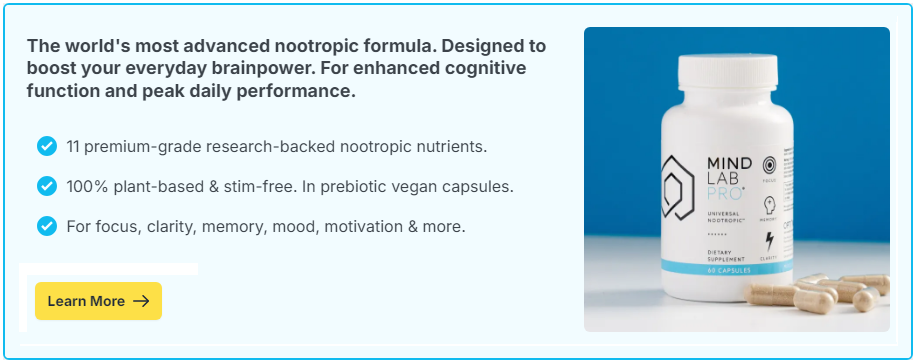
Software development is one of the most cognitively demanding professions in the modern workforce. Whether writing thousands of lines of code, debugging intricate problems, or learning new programming languages and frameworks, developers rely on sharp focus, memory retention, and deep problem-solving skills. However, the intense mental strain of coding can lead to brain fog, mental fatigue, and burnout—especially when working on long, complex projects.
To stay mentally sharp, software engineers need more than just technical knowledge—they require strategies and tools to optimize their cognitive function. From nutrition and sleep to nootropics and mindfulness, there are many ways to enhance focus, maintain mental clarity, and improve coding efficiency.
Contents
The Cognitive Challenges of Software Development
Programming is not just about writing code—it’s about solving complex problems, understanding abstract concepts, and structuring logical sequences. The cognitive load placed on developers is immense, requiring high levels of concentration and analytical thinking.
High Concentration Requirements
Developers often work in “deep focus” mode, where sustained attention is required to manage complex logic, troubleshoot errors, and maintain efficiency. Disruptions or cognitive fatigue can break this focus, leading to inefficient debugging and slower development cycles.
Complex Problem-Solving
Programming is fundamentally about solving problems. Whether designing algorithms, debugging an elusive error, or optimizing performance, software developers must process multiple layers of logic while keeping the broader system architecture in mind.
Learning New Technologies
The tech industry evolves at a rapid pace, with new programming languages, frameworks, and best practices emerging regularly. Developers must engage in continuous learning to stay relevant, requiring strong memory retention and adaptability.
Long Hours and Mental Fatigue
Many developers work late into the night, especially when facing deadlines or troubleshooting urgent bugs. Long hours can lead to cognitive fatigue, reducing efficiency and increasing the likelihood of errors.
Debugging-Induced Frustration
Tracking down an elusive bug can be mentally exhausting, especially after hours of effort without resolution. This can lead to frustration, stress, and decreased motivation, all of which impact overall cognitive function.
Cognitive Support Strategies for Software Developers
Maintaining cognitive sharpness throughout a coding project requires a combination of lifestyle habits, strategic rest, and cognitive-enhancing supplements. Below are key strategies to support brain function and optimize performance.
Optimize Your Work Environment
- Minimize distractions: Use noise-canceling headphones or instrumental music to maintain focus.
- Use ergonomic setups: Proper chair height, monitor placement, and wrist support can reduce physical strain.
- Adjust lighting: Use blue-light filters in the evening to reduce eye strain and improve sleep quality.
Follow a Brain-Boosting Diet
What you eat significantly impacts cognitive function. A diet rich in brain-supporting nutrients enhances memory, focus, and mental stamina.
- Omega-3 fatty acids: Found in fish, flaxseeds, and walnuts, these support cognitive function and memory.
- Antioxidants: Blueberries, dark chocolate, and leafy greens help reduce oxidative stress in the brain.
- B vitamins: Essential for neurotransmitter function, found in eggs, whole grains, and lean meats.
- Complex carbohydrates: Brown rice, quinoa, and legumes provide sustained energy for long coding sessions.
Prioritize Sleep for Mental Clarity
Software developers often sacrifice sleep to meet deadlines, but inadequate rest impairs cognitive performance. Deep sleep is essential for memory consolidation and problem-solving skills.
- Stick to a schedule: Going to bed and waking up at consistent times enhances sleep quality.
- Reduce screen time before bed: Blue light from screens suppresses melatonin, making it harder to fall asleep.
- Take power naps: A short 10–20 minute nap can refresh focus without causing grogginess.
Exercise to Enhance Cognitive Function
Regular physical activity improves brain function by increasing blood flow and oxygen delivery to brain cells.
- Aerobic exercise: Running, swimming, or cycling enhances mental clarity and reduces stress.
- Strength training: Lifting weights has been linked to improved cognitive function.
- Stretching and mobility: Helps reduce tension from prolonged sitting at a desk.
Nootropics for Software Developers
Nootropics, or “smart drugs,” are supplements and compounds that enhance cognitive function, improving memory, focus, and problem-solving ability. For developers facing long hours of coding, debugging, and learning, nootropics can be a valuable tool.
Caffeine + L-Theanine
This classic combination provides sustained energy without the jitters. Caffeine increases alertness, while L-theanine promotes relaxation and reduces anxiety.
Modafinil
Originally developed to treat narcolepsy, modafinil is a powerful wakefulness-promoting nootropic that enhances focus and mental endurance. It’s particularly beneficial for long coding sessions.
Bacopa Monnieri
A natural adaptogen known for enhancing memory and cognitive processing speed. Regular use can improve retention of new programming concepts.
Lion’s Mane Mushroom
Supports neuroplasticity, making it easier to learn and retain complex coding techniques.
Rhodiola Rosea
Reduces fatigue and improves mental stamina, helping developers stay sharp during long debugging sessions.
Creatine
While often associated with physical performance, creatine also enhances cognitive function by providing energy to brain cells.
Additional Productivity Techniques for Developers
The Pomodoro Technique
Work in 25-minute intervals with 5-minute breaks to maintain sustained focus and prevent burnout.
Mind Mapping
Visualizing complex problems can help developers structure their thoughts and generate creative solutions.
Brain.fm and Binaural Beats
Listening to brainwave-optimized music can enhance focus and reduce distractions.
Task Prioritization
Using tools like Notion, Trello, or Asana helps keep track of coding tasks, reducing cognitive overload.
Software development demands sustained focus, complex problem-solving, and the ability to learn rapidly. By optimizing diet, sleep, exercise, and using nootropics strategically, developers can maintain peak mental performance throughout their projects.
Combining cognitive support strategies with productivity techniques ensures that developers stay sharp, avoid burnout, and continue producing high-quality code efficiently. With the right approach, software engineers can enhance their mental endurance and stay at the forefront of technological innovation.

